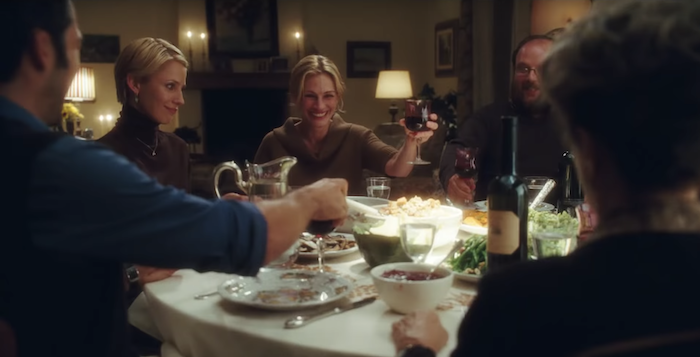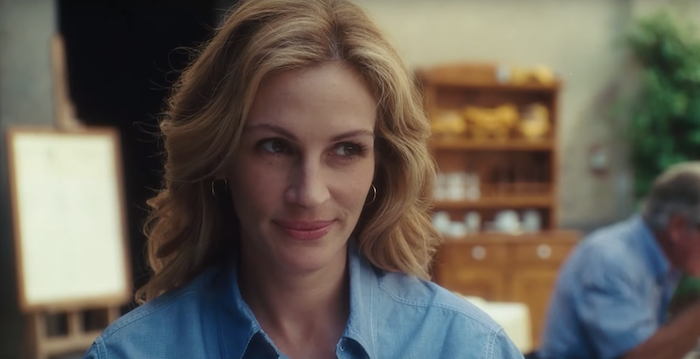In the biographical romantic drama Eat Pray Love, unfulfilled business woman Elizabeth Gilbert – played by Julia Roberts – leaves behind her marriage, house and high-flying job in America to embark on a year-long spiritual journey of self-discovery in Italy, India and Indonesia.
Her first stop is Rome where she spends four month stint learning the Italian language, eating so much pasta and pizza that her jeans no longer fit, and immersing herself in Italian culture with the help of her new group of friends.

In the movie, there are numerous dialogues that play out in Italian or in a mix of Italian and English. You can find out the meaning of these conversations by turning on the English subtitles, but switching over to Italian subtitles doesn’t give you the Italian transcription.
In this post, we have transcribed every scene featuring the Italian language, in addition to providing the English translation. This way, you can follow the dialogue while picking up some new Italian phrases you may never have known before!

Scene 1: In the bath
Liz – Macchina peppa…macchina peppa (She means macinapepe which is the word for pepper grinder)
Liz – Lascito…legacy…
Scene 2: At Liz’s new apartment in Rome
Liz – Non abbastanza. (Not enough.)
Landlady – È abbastanza. Se tu versi l’acqua tre, quattro, cinque volte…everything that’s important gets cleaned! (It’s enough. If you pour the water three, four, five times…everything that’s important gets cleaned!)
Liz – Is this safe, this scaffolding?
Lady – Perché l’impalcatura regge il soffitto. Se no si sfascerebbe. Tutto si sfascia, cara mia. L’unica cosa che rimane è la famiglia. (Because the scaffolding holds up the ceiling. Otherwise it would fall apart. Everything falls apart, my dear. The only thing that remains is the family.)
Landlady – You’re not married.
Liz – No, divorziata. (No, divorced.)
Landlady – Perché divorziata? (Why divorced?)
Liz – È rotto…we broke it. (It’s broken…we broke it.)
Landlady – You’re more happy now? Io ho una regola. Ogni uomo che viene qui, non si ferma a dormire la notte. Voi ragazze americane quando venite in Italia volete solo pasta e sausage! (You’re more happy now? I have a rule. Every man that comes here, he doesn’t stay the night. You American women, you only want pasta and sausage when you come to Italy!)
Julia – Io prende. (She means lo prendo = I’ll take it referring to the apartment)
Lady – E fai bene, brava. (Good for you.)
Scene 3: At the coffee shop
Liz – Cappuccino por favore. (She means per favore = please)
Sofi – Due cappuccini per favore, latte tiepido questa volte perché ieri troppo caldo, mi sono scottata la lingua. (Two cappuccinos, please. Lukewarm milk this time because yesterday, too hot, I burned my tongue.)
Barman – Mi dispiace, cara. (I’m sorry, dear.)
Sofi – You like Napoleans?
Liz – Of course.
Sofi – Due napoleoni per favore. (Two Napoleans please.)
Barman – Benissimo. Tutto quello che vuoi. (Fine. Whatever you want.)
Sofi – Grazie. Napoleoni. (Thanks. Napoleans.)
Liz – Perfetto. (Perfect.)
Scene 4: On the street
Group of guys chasing girls – A bone! Anvedi! (Beautiful! Check it out! in the Roman dialect. Bone is often pronounced with double “b”, bbone.)
Scene 5: Lesson with tutor Giovanni
Giovanni – You can say egli attraversò… (You can say he crosses.)
Liz – Egli attraversò… (He crosses.)
Giovanni – It’s past. Noi attraversammo. (It’s the past. We crossed.)
Liz – Noi attraversammo. (We crossed.)
Giovanni – Voi attraversaste. Essi attraversarono. (You crossed. They crossed.)
Liz – Too fast.
Giovanni – Ok, we can say attraversiamo. (Ok, we can say we cross.)
Liz – Attraversiamo. Oh, what a beautiful word! (We cross. Oh, what a beautiful word.)
Giovanni – Oh come on, it’s let’s cross over. It’s so ordinary.
Liz – Buona notte. (Goodnight.)
Giovanni – Buona notte. (Goodnight.)
Scene 6: In Liz’s bedroom / restaurant
Liz – Sola. Sono da sola. Sola. (Alone. I’m alone. Alone.)
Waiter – Buon appetito. (Bon appetit.)
Scene 7: Barber shop
Liz – Your name is Luca Spaghetti?
Luca – Davvero. La mia famiglia si chiama così. We invented it. I’m serious. (Seriously. That’s what my family is called. We invited it. I’m serious.)
Giovanni – We call it “Il dolce far niente”. It means the sweetness of doing nothing.
Barber – Non si parla così l’italiano. Si parla con i gesti. Si può parlare tutte le lingue muovendo le mani. (That’s not how you speak Italian. You speak with gestures. You can speak every language moving your hands.)
Barber – Con i gesti! Braccia! Gesticolare! (With gestures! Arms! Make gestures!)

Scene 8: On the street
Man – *smacks Sofi’s bum* A bona! (Beautiful!)
Sofi – Vaffanculo, che fai! (F*** off, what are you doing!)
Everyone – *motorcycles almost hit them* Ma vaffanculo! (F*** off!)
Scene 9: At a restaurant ordering food
Luca – Allora per iniziare, io prenderei… (Ok so to start with, I’ll have…)
Liz – Scusa, vieni qua. Per la tavola, un piattone di carciofi alla giudia, prosciutto e melone, e melanzane con ricotta affumicata. Poi spaghetti alla carbonara, pappardelle con ragù di coniglio e linguini con vongole. Poi trippa alla romana e saltimbocca. E altri due litri di vino sfuso di Genzano. Grazie. (Excuse me, come here. For the table, a plate of artichokes alla giudia, ham and melon and eggplant with smoked ricotta. Then spaghetti alla carbonara, pappardella with rabbit ragù and linguini with clams. Then tripe alla romana and saltimbocca. Two more litres of Genzano house wine. Thanks.)
Everyone – Brava! (Well done!)
Liz – That is a real Roman woman.
Giulio – Con tanti amici internazionali, mi pare. (With lots of international friends, it seems.)
Luca – Io, un mozzico glielo darei! (I would give her a bite!)
Everyone – Salute ragazzi, alla vostra. (Cheers guys, to your good health!)
Scene 10: Football game
Old man – Ma per chi giochi, per chi! (Whose side are you on, whose side!)
Scene 11: At the clothes store
Shopkeeper – Vuole vedere altro? (Do you want to see anything else?)
Sofi – Solo i jeans, grazie. (Just the jeans, thanks.)
Shopkeeper – Prego. (You’re welcome.)
Sofi – That’s beautiful. You should get it.
Liz – Per chi? (For who?)
Sofi – For you, Liz.
Scene 12: Leaving the car
Giovanni – Ce la fai? (Can you manage?)
Liz – Thanks for the day, and the leg room.
Giovanni – Ci siamo divertiti però. (We had fun though.)
Sofi – We’re going to go for food later, wanna come?
Liz – No, I’m good.
Giovanni – No dai, per favore, vieni. (Oh come on, please, come.)
Liz: Grazie, grazie. (Thanks, thanks.)
Scene 13: Eating on the floor at home
Liz – Dolce far niente. (Sweetness of doing nothing.)
Scene 14: Thanksgiving dinner
Mother – Mi peli ancora un po’ di patate? (Can you peel a few more potatoes for me?)
Giovanni – No dai, che palle le patate però. (Oh come on, not the potatoes.)
Luca – It’s my dream, a real American Thanksgiving.
Mother – Oh, Luca, su! (Oh, Luca, enough.)
Giulio – Guarda un po’…c’è zia Liz che ci sta preparando un piatto Americano. (Look…auntie Liz is preparing us an American dish.)
Mother – Ma cosa c’è che non va con questa tua amica. Non sarà mica lesbica. (What’s up with your friend? She isn’t a lesbian, is she?)
Giovanni – No, non è lesbica e capisce l’italiano. (No, she’s not a lesbian and she understands Italian.)
Luca – Appunto. (Exactly.)
Mother – Come fa a trovare un altro marito e mettere su una famiglia dall’altra parte del mondo. (How is she going to find another husband and have a family on the other side of the world.)
Sofi – Ma Rufina, se uno dice che vuole viaggiare per un anno e cercare… (But Rufina, if one wants to travel for a year and look for…)
Mother – Ma lei non è un uomo, eh. (But she’s not a man, eh.)
Daughter – È molto più difficile per una donna sentire di avere dei diritti nella vita, di fare delle scelte. Ci vuole coraggio. (It’s much more difficult for a woman to feel she has rights in life, to make choices. You need courage.)
Sofi – Si. (Yes.)
Mother – Tu lo chiami coraggio. Io la chiamo stupidità. (You call it courage. I call it stupidity.)
Giovanni – Mamma basta, dai! (That’s enough, mom.)
Liz – Conosco gente che sarebbe d’accordo. Luca, a che ora sarà pronto il tacchino? (I know people who would agree. Luca, when will the turkey be ready?)
Luca – Il tacchino? Non l’ho mica scongelato io. (The turkey? I didn’t defrost it.)
Liz – Oh shit!
Giovanni – Cazzo, una cosa dovevi fare! (Crap, you had one job!)
Luca – Può capitare, no! Che ne so, mi sono distratto. C’è troppo cibo buono e troppe donne. Non mi è venuto in mente. Troppe donne e troppo cibo. (It can happen! I don’t know, I got distracted. There’s too much good food and too many women. It didn’t occur to me. Too many women and too much food.)
Liz: Salute! (Cheers!)
Giovanni: Ma che meraviglia! (Oh how wonderful!)
Luca: Buonissimo! (Delicious!)
Daughter – Me lo passi poi anche a me? (Can you pass it to me next?)
Luca – Il tacchino? (The turkey?)
Other indistinct words…

Heather Broster is a graduate with honours in linguistics from the University of Western Ontario. She is an aspiring polyglot, proficient in English and Italian, as well as Japanese, Welsh, and French to varying degrees of fluency. Originally from Toronto, Heather has resided in various countries, notably Italy for a period of six years. Her primary focus lies in the fields of language acquisition, education, and bilingual instruction.


